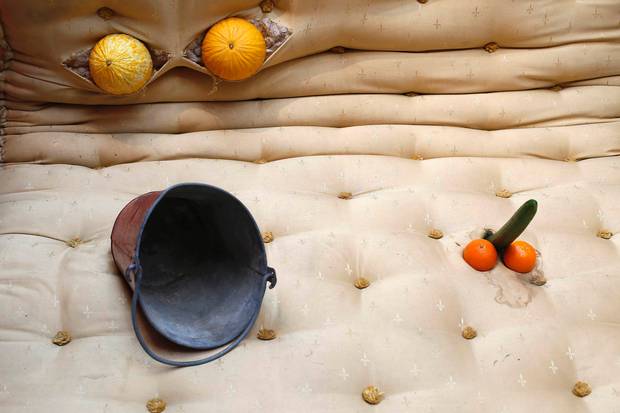Errors & Omissions: the kind of writing about art and ‘the human condition’ that puts people off
Plus live film, smirks, stars, an outstanding mixed metaphor and the journalese ‘after’ from last week’s Independent

I have never seen the works of the Young British Artist Sarah Lucas, and a piece published on Wednesday about a Lucas exhibition at the Venice Biennale did not encourage me to make the experiment.
Here is a sample: “Her signature work, Au Naturel, composed of a cucumber, two oranges, a melon and bucket arranged on a slumped, stained mattress, still says more about sex and the human condition than endless polished stone ever could.”
This kind of pretentious and po-faced art writing invites parody and appeals only to the already converted. This example of it also reveals that whatever Au Naturel may have taught the writer about “sex and the human condition” it failed to get any information across about the human female anatomy. An internet search for images of this celebrated artefact reveals that it includes not just “a melon” but, as you might expect, two melons.
• On Wednesday, we carried a report of plans to reopen the Regent Street Cinema in London. It carried this introductory blurb: “London theatre where Lumière brothers first presented live film re-opens its doors”. What is “live film”? Surely what is meant here is “moving pictures”.
• We published a story on Tuesday about the Bullingdon Club. A photograph dating from 1988 shows, apparently, David Cameron “with what appears to be a smirk on his face, standing in the centre of the Bullingdon group, his chest puffed out in apparent pride”.
What is the appearance of a smirk? How does it differ from a smile? Can we agree once and for all that it doesn’t. A smirk is simply a smile on the face of a person the writer considers selfish or insincere. The word is pure value judgement. It has no place in news reporting.
• On Thursday, we reported Simon Callow’s opinion that Orson Welles, for all his cinematic genius, wasn’t a good Shakespearean actor. The story attributed this opinion to “Shakespeare in Love star Callow”.
I fear it may be too late to rescue the word “star” from the disastrous devaluation it has suffered in recent years. In Shakespeare in Love, Callow turns in a performance of his usual cracking standard, but in what is undoubtedly a supporting role, that of Tilney, the Master of the Revels.
• On Monday, we carried a report of continuing extremism following the Birmingham schools “Trojan Horse” affair. A picture caption gave us a vivid mixture of metaphors: “Headteacher Sarah Hewitt-Clarkson said Trojan Horse was just the tip of the iceberg.”
• Mark Miller writes in to point out this, from an article last Saturday about Charlotte Gainsbourg: “She’s referring to her half-sister Kate Barry, who died in 2013, aged 46, after she was found dead on the pavement outside her fourth-floor flat.”
The abuse of “after” to mean “because” is something we have become used to. “After” meaning “before” is new.

Join our commenting forum
Join thought-provoking conversations, follow other Independent readers and see their replies